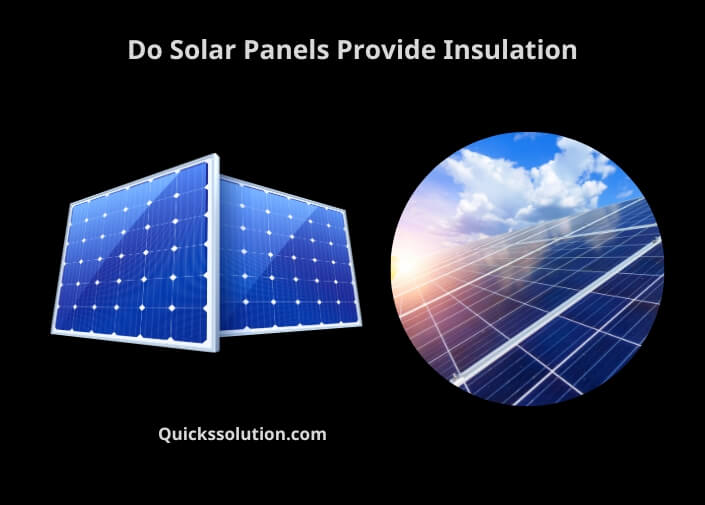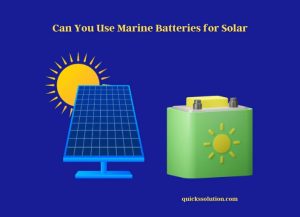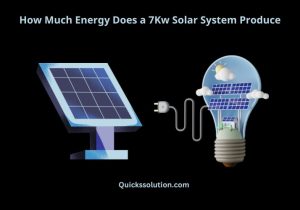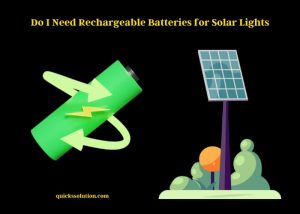Published on: June 11, 2023
Written by John Stevens / Fact-checked by Hashim Manna
From a bird’s eye view, solar panels may just seem like sleek additions to rooftops, symbols of sustainable living. But there’s more than what meets the eye. The question at hand is, “Do solar panels provide insulation?” Let’s embark on a detailed exploration to uncover the relationship between solar panels and insulation, and how they can enhance your home’s energy efficiency.

Do Solar Panels Provide Insulation?
Yes, they do! While primarily known for their electricity production, solar panels also have an insulating effect. But how does this occur? Here’s the kicker: solar panels can protect your roof from direct sunlight, reducing heat absorption, and hence, lowering your home’s overall temperature.
Understanding the Basics: How Do Solar Panels Work?
Photovoltaic Effect: The Backbone of Solar Panels
In the heart of every solar panel is the photovoltaic effect. This process, discovered by French physicist Edmond Becquerel, is the ability of some materials to generate electric current when exposed to sunlight.
The Magical Layers of Solar Panels
A solar panel is composed of a layer cake of materials. The uppermost layer of protective glass and an anti-reflective coating captures the sunlight, which then seeps into the silicon cells. The cells convert the light into electricity, which is finally transferred to your home’s electrical system. A marvel of modern technology, isn’t it?
The Insulating Effects of Solar Panels
Shading: The Unseen Role of Solar Panels
By sitting on your roof, solar panels act as a shield against the sun, reducing heat absorption. This shade can result in a lower temperature in your attic by up to 5 degrees Fahrenheit!
Protection Against the Elements
Solar panels are not just sun blocks; they also act as a barrier against weather conditions. They protect your roof from rain, snow, and wind, reducing wear and tear. That’s a solid two-for-one deal!
Beneficial Side Effects of Solar Panel Insulation
Reduced HVAC Load
By reducing heat absorption, the insulating effect of solar panels can also lessen the load on your air conditioning system, contributing to energy savings.
Longer Roof Lifespan
Solar panels can extend the lifespan of your roof by protecting it from the elements. This can delay costly roof repairs or replacements. Isn’t that a bang for your buck?
Do Solar Panels Insulate in Winter?
You might think solar panels only insulate in summer, but here’s the surprise: they can help maintain your home’s temperature even in winter. They not only convert sunlight into electricity but also absorb residual heat, acting as a thermal barrier.
Maximizing the Insulation Effect of Solar Panels
Proper Installation
The insulating effect of solar panels is amplified by a small gap left between the panels and the roof during installation. This creates an extra layer of air insulation.
Combine with Conventional Insulation
For a belt and braces approach, you can pair solar panels with conventional insulation methods such as foam or fiberglass. This combo can maximize your home’s energy efficiency.
Understanding the Limitations
While solar panels do offer some insulation, remember that they are primarily designed for electricity generation. Therefore, they should not be relied upon as the sole method of insulation.
FAQs
Do solar panels provide insulation?
Yes, solar panels can provide insulation by shading your roof from the sun and reducing heat absorption.
How do solar panels work?
Solar panels work by utilizing the photovoltaic effect to convert sunlight into electricity.
Do solar panels insulate in the winter?
Yes, they can absorb residual heat, acting as a thermal barrier.
Can solar panels increase my roof’s lifespan?
Yes, by protecting it from the elements, solar panels can extend your roof’s lifespan.
Can I rely solely on solar panels for insulation?
While they do provide some insulation, solar panels are primarily designed for electricity generation. Therefore, they should be used in conjunction with conventional insulation methods.
How can I maximize the insulation effect of solar panels?
You can maximize this effect by ensuring proper installation and combining the use of solar panels with conventional insulation methods.
Conclusion
So, do solar panels provide insulation? The answer is a resounding yes. They shield your roof from the sun, reduce heat absorption, protect your roof from the elements, and can even contribute to a longer roof lifespan. However, it’s important to remember that while solar panels do provide these added bonuses, their primary function is electricity generation. Therefore, they should be used alongside conventional insulation methods to ensure maximum energy efficiency.
Solar energy is the gift that keeps on giving. It’s not just about generating electricity; it’s about leveraging every part of the system to ensure your home is as energy-efficient as possible. With the proper installation and a holistic approach, solar panels can contribute significantly to the insulation of your home, saving you energy and money in the long run.
Read more:



